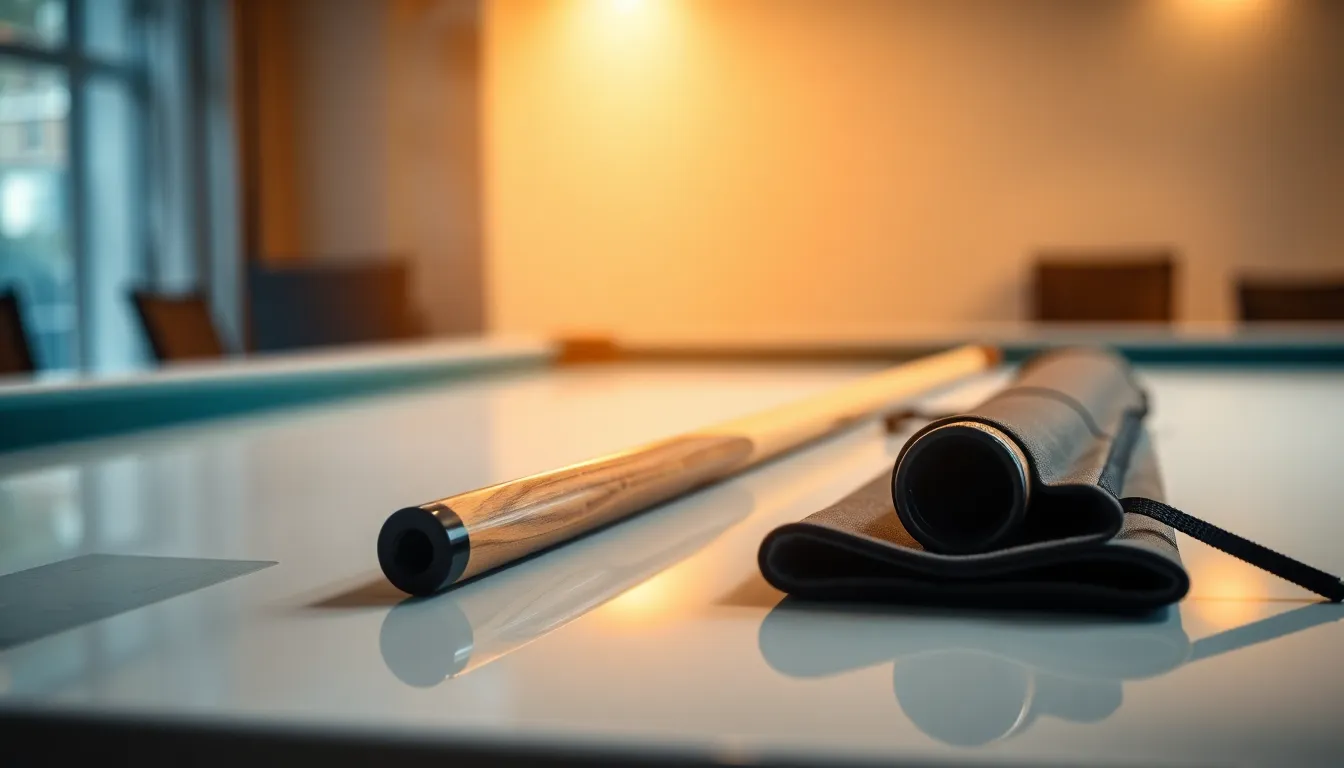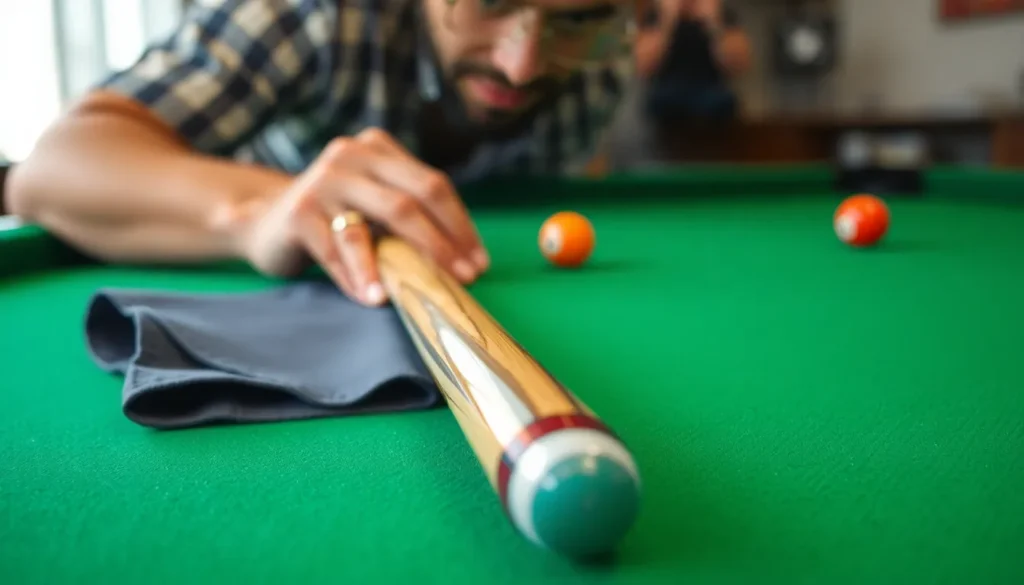Table of Contents
ToggleA well-maintained pool cue is like a trusty sidekick in the game of billiards—always ready to help you sink that eight ball. But let’s face it, many players treat their cues like they’re invincible, forgetting that even the best cues need a little TLC. Neglecting proper maintenance can lead to a warped shaft or a misaligned tip, turning your cue from a sharpshooter into a wannabe slingshot.
Importance Of Pool Cue Maintenance
Maintaining a pool cue remains crucial for optimal gameplay. Neglect can lead to various performance issues that affect a player’s overall experience.
Enhancing Performance
Regular maintenance enhances performance. A well-kept cue provides consistent feedback, improving shot accuracy. Players can achieve better control and precision through proper upkeep. Routine tip replacement ensures a solid hitting surface, which translates to better ball interaction. Maintaining a clean shaft allows for smoother strokes and fewer mishits. Overall, attentive maintenance translates directly into improved gameplay and a more enjoyable experience.
Extending Lifespan
Extended lifespan results from diligent cue care. Cleaning the shaft prevents dirt buildup, which can lead to wear and tear. Proper storage avoids warping caused by environmental factors. Regular inspection enables identification of issues before they become serious problems. Players save money by delaying cue replacement with proper maintenance. Handling cues with care during gameplay also enhances durability, making maintenance an effective strategy for long-term investment.
Basic Pool Cue Care

Maintaining a pool cue is essential for optimal performance and longevity. Proper care can prevent issues that affect gameplay.
Regular Cleaning
Clean the shaft regularly using a microfiber cloth to remove dust and oils. Wipe the tip with a damp cloth after each use to keep it free of chalk and debris. Employ a gentle cleaning solution for stubborn dirt but avoid harsh chemicals that could damage the finish. Ensure the cue stays dry to prevent moisture from seeping into the wood. Routine cleaning promotes smoother strokes and enhances shot accuracy, contributing to a better playing experience.
Proper Storage
Store the pool cue in a case to protect it from physical damage and environmental factors. Avoid leaving the cue in direct sunlight as heat can warp the wood. Use a wall rack to keep cues upright, preventing warping and bending. During transport, ensure the cue is well-cushioned to avoid impacts. Maintaining proper storage conditions fosters durability, extending the cue’s lifespan and optimizing performance during play.
Advanced Maintenance Techniques
Advanced maintenance techniques ensure a pool cue performs at its best and lasts longer. Players can enhance their game by focusing on specific areas, such as tip replacement and joint care.
Tip Replacement
Replacing the tip regularly is vital for maintaining shot accuracy. Although different cue tips vary in hardness and texture, most players should consider changing the tip every few months, depending on usage. Signs of wear include flattening and missing chunks. Selecting the right type of tip—whether leather, phenolic, or layered—can also impact performance. To replace the tip, players should remove the old one carefully using a razor and sand the shaft minimally to create a smooth surface. After applying a strong adhesive, securing the new tip in place ensures proper bonding. Players can expect an immediate improvement in control and precision with a fresh tip.
Joint Care
Cues often consist of multiple pieces, making joint maintenance essential for optimal performance. Regularly inspecting the joints for dirt and debris is important to prevent misalignment. Cleaning can be done using a soft cloth and a gentle cleaning solution, ensuring all residue is removed. If joints feel loose, tightening them slightly may help restore stability and ensure a secure connection. Players should avoid using excessive force, as this could damage the threads. A well-maintained joint contributes significantly to the cue’s overall feel, leading to a smoother stroke and improved execution during games.
Common Mistakes In Maintenance
Many players make critical errors in their pool cue maintenance routines. These oversights can lead to significant performance issues and decreased longevity of the cue.
Over or Under Oiling
Applying too much or too little oil to the cue’s shaft leads to compromised performance. Over-oiling creates a slippery surface, making it difficult for players to grip the cue efficiently. Insufficient oil, on the other hand, can result in dryness, causing the wood to crack or warp. A balanced application is essential; players should use a small amount of oil to condition the wood without saturating it. Regularly checking the shaft’s condition can ensure the proper amount of oil is maintained.
Ignoring Damage
Ignoring visible damage on the cue often results in declining performance. Small dents or scratches can affect how a cue strikes the ball, impacting shot precision. Players should inspect their cues frequently for any signs of wear, such as chipped tips or damaged joints. Immediate attention to these issues can prevent further deterioration. Repairing or replacing damaged components ensures that the cue functions optimally during gameplay, enhancing the overall experience on the table.
Tools And Products For Maintenance
Maintaining a pool cue requires specific tools and products to ensure optimal performance. The right selection keeps cues in pristine condition.
Recommended Cleaners
Mild soap mixed with water serves as an effective cleaning solution for cue shafts. Players often use microfiber cloths to wipe surfaces clean, as these prevent scratches. For stubborn dirt, gentle commercial cue cleaning products offer a safe alternative. Avoid abrasive cleaners or harsh chemicals that could damage the finish. Regular use of a damp cloth on the tip eliminates chalk buildup, which can affect shot accuracy. Ensuring the cue remains clean contributes significantly to its performance.
Essential Accessories
A high-quality cue case protects the cue from physical damage and environmental factors. Additionally, players benefit from a tip tool, which helps shape and maintain the tip for better contact with the ball. Chalk is another crucial accessory; proper chalk enhances grip during shots, reducing miscues. Joint protectors preserve the cue’s joints and prevent wear. Keeping these essential accessories handy plays a significant role in cue longevity and performance.
Maintaining a pool cue is essential for any serious player. Regular care not only enhances performance but also prolongs the cue’s lifespan. By implementing basic cleaning routines and addressing any issues promptly, players can ensure their cues remain reliable partners on the table.
Investing time in proper maintenance pays off in improved shot accuracy and control. Whether it’s routine tip replacements or keeping the cue stored correctly, these practices make a significant difference in gameplay. With the right tools and techniques, players can protect their investment and enjoy a better billiards experience for years to come.




